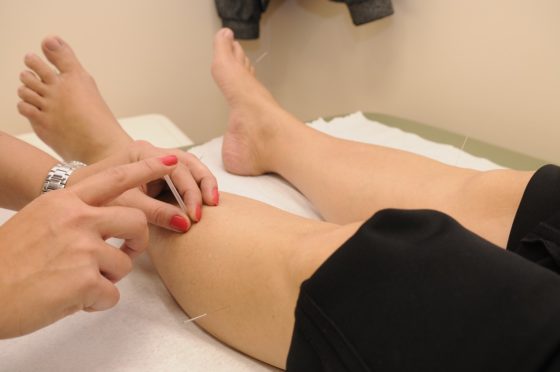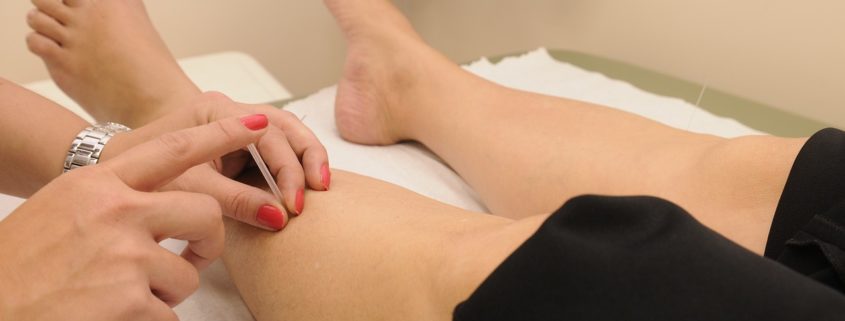Acupuncture and Fertility: Does it Help You Get Pregnant?

According to the Centers for Disease Control and Prevention, approximately 12% of American women (aged 15-44 years) have fertility problems or trouble carrying a baby to term, and 6% of married women are unable to conceive after 12 months of trying. Assisted reproductive technologies are expensive, time-consuming, and emotionally draining. So, couples and physicians alike are always looking for alternative treatments to improve fertility. One such treatment that shows promise is acupuncture.
Below, we’ll go over what acupuncture is, how it can help with fertility, where to get acupuncture, and how to determine if it’s right for you and your family.
Contents
What is acupuncture?
With its origins in traditional Chinese medicine, acupuncture is one of many holistic or complementary treatments gaining favor with the medical profession. It involves a trained therapist inserting thin needles into specific points on the skin, stimulating the sensory nerves. It is believed this causes the release of pain-relieving endorphins.
Traditionally, acupuncture is believed to improve the flow of the body’s natural energy, or “Qi.” Acupuncture is relatively pain-free and side effects are rare. It is widely used for management of pain, depression, anxiety, and many other disorders.
So, does it work?
The National Center for Integrative and Complementary Health reports the following:
Results from a number of studies suggest that acupuncture may help ease types of pain that are often chronic, such as low-back pain, neck pain, and osteoarthritis/knee pain. … The effects of acupuncture on the brain and body and how best to measure them are only beginning to be understood. Current evidence suggests that many factors — like expectation and belief — that are unrelated to acupuncture needling may play important roles in the beneficial effects of acupuncture on pain.
What acupuncture has to do with getting pregnant is a bigger story.
See also: Foods for Fertility: Eating for Two (Hopefully)!
Acupuncture and Fertility
As with many complementary therapies, research often fails to provide conclusive evidence that acupuncture is effective in a given medical field. Unlike pharmaceutical research, which is heavily funded, complementary medicine research tends to produce small studies that lack statistical power. There is, however a growing body of evidence and popularity for using acupuncture as an adjunct to traditional western medicine in the fertility field.
Some key points to consider from recent studies:
- Promising research looking at infertility caused by polycystic ovarian syndrome found that a treatment protocol combining acupuncture, herbs, and therapeutic exercises produced similar improvements in ovulation and pregnancy rate as standard drug-based protocols.
- A 2016 study found that in sub-fertile women, a “multiphasic acupuncture protocol” significantly increased fertility awareness (86.4%, compared to 40% in controls). While conception rates themselves did not increase, those who “conceived did so in half the time.”
- Another study in 2016 concluded that “during the preconception period, there is mixed evidence for acupuncture to improve ovulation, or increase pregnancy rates… sperm quality may improve… there is insufficient evidence to determine whether this results in improved pregnancy and live birth rates.” So, men may benefit from acupuncture in terms of fertility.
- A study reported in the International Journal of Women’s Health in 2014 reported that “there is preliminary data indicating acupuncture may improve menstrual health and coping for women experiencing delays falling pregnant.”
- It is well known that depression and fertility problems go hand in hand: Infertility may lead to depression, and depression may worsen infertility. Recent research found that the addition of acupuncture to antidepressant treatment improved depression and caused changes in the amygdala (part of the brain which sparks the fight-or-flight response).
- Finally, an article in the prominent journal Primary Care concluded that “the use of mind-body medicine (including acupuncture) in the antenatal period assists patients in childbirth preparation. Integrative medicine techniques can be safely and effectively used for common third-trimester obstetric complications of pregnancy.”
Although, as mentioned, some evidence is inconclusive in terms of fertility improvements, it definitely isn’t bad to go in for acupuncture treatments. At the least, it may help reduce the stress associated with trying to get pregnant in the first place and be a relaxing experience!
Who can provide acupuncture?
Acupuncture is provided by specialized acupuncturists, integrative or functional medicine practitioners, and by an increasing number of traditional medical practitioners. Your health, time, and money are very precious, so it’s important to look for a certified, licensed and highly trained professional in your area. The National Certification Commission for Acupuncture and Oriental Medicine has a directory of certified acupuncture practitioners to be used by the general public as well as state licensing agencies and insurance companies.
It’s a good idea to always check costs and the predicted number of sessions before you start any sort of therapy, and explore whether your medical insurance will contribute to the costs. It is not recommended that acupuncture is used to delay medical opinion or treatment.
Should I consider acupuncture if I’m trying to get pregnant?
Couples who are struggling with fertility who are open to complementary therapies may wish to consider acupuncture alongside traditional treatment. While the evidence that acupuncture is beneficial in fertility treatment is not conclusive (perhaps only due to a lack of funding for research), acupuncture is increasingly used alongside Western medicine to increase the chances of conceiving.
For more of Safe Birth Project’s recent articles about fertility, see below:








Leave a Reply
Want to join the discussion?Feel free to contribute!